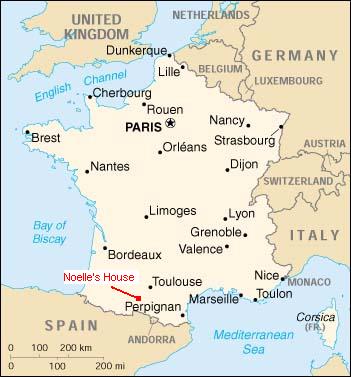 "The world is a
book, and those who do not travel, read only a page." Saint Augustine
"The world is a
book, and those who do not travel, read only a page." Saint Augustine
|
 "The world is a
book, and those who do not travel, read only a page." Saint Augustine
"The world is a
book, and those who do not travel, read only a page." Saint Augustine
After spending five months in Cape Town doing actual work, I decided to visit my stepdaughter Noelle at her house in Southwestern France. You may remember Noelle from the start of this journey, back at the start of 2001. There were a number of reasons for this, part of which was that my long work project chewed up the entire summer in South Africa, and I didn't really want to start out cycling there in the winter because I'm a pansy-assed whining crybaby. Noelle promised me faithfully that rain is not allowed in Southwestern France after May 15, so it seemed like the obvious place to go.
Once I actually decided to visit Noelle, I figured I'd take a week or two to clear the decks in Cape Town and then take off. It turned out that I could get a great price the very next day, and then not again for weeks. That meant that after being in Cape Town for 6 months and South Africa for 9 months, I was writing my postcards at the airport just like I do in every country. Maybe there's a pattern here.
Noelle and her boyfriend David, live in Southwestern France between Toulouse and the border with Spain. I flew into Toulouse, to find that it was in fact raining. As it turned out, her prediction of sunny weather after the 15th was a bit optimistic, but no matter. I still had work to do, and I haven't talked face-to-face with anyone I knew before I left in over a year so staying at her house for a few weeks was a nice holiday from my holiday... or wait, wasn't that what the work time in Cape Town was... this is getting confusing. I think it's like this: I stopped in Cape Town to rest up from my holiday, and now I'm stopping in France to rest up from resting up in Cape Town. I'm going to have to get back on the bike soon, or my sentences will become horribly run-on.
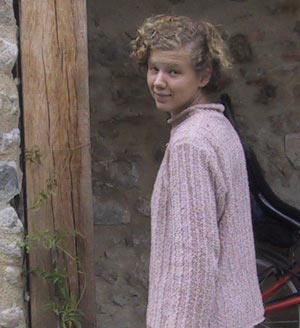 Noelle lives in a rural area dotted with
lots of quaint little French villages. I find it tremendously amusing that I grew up in the country
and turned into a city boy, and Noelle grew up in the city and has turned into a country girl. Most of
what I know about the area I got from Noelle and David because I didn't really get out and ride much.
This is a really old area, and the population seems to consist of old families that have lived here for
multiple generations, and some new people moving down from the big city or foreign countries. David
settled here after driving through the area quite a few times while traveling between France and Spain.
Noelle lives in a rural area dotted with
lots of quaint little French villages. I find it tremendously amusing that I grew up in the country
and turned into a city boy, and Noelle grew up in the city and has turned into a country girl. Most of
what I know about the area I got from Noelle and David because I didn't really get out and ride much.
This is a really old area, and the population seems to consist of old families that have lived here for
multiple generations, and some new people moving down from the big city or foreign countries. David
settled here after driving through the area quite a few times while traveling between France and Spain.
The land around here is particularly green and beautiful at this time of year. Noelle has a gorgeous garden, flower gardens, and a view of the mountains, so it's a generally nice place to visit. The country around here is gorgeous. It's right on the edge of the Pyrenees. If you look at the map, the Pyrenees straddle the border between Spain and France. In fact, the Pyrenees are the reason that there's a Spain at all as at various times in history it acted as a buffer between Europe and the Iberian Peninsula. I'll talk more about that when I get to Spain.
The demographics for this region are a bit strange. Most people that grow up here tend to leave for the city when they get into their late teens or early 20s. Then some of them come back when they're much older to raise their children here. That's apparently a function of the economy and job situation. That means that you just don't see a whole lot of people around in their 20s. They're not unknown of course, but there aren't quite as many as one would assume. This probably matches a lot of rural areas in the U.S., but I haven't been to any of them.
Every country in the European Union except Great Britain converted their money systems over to the Euro at the start of 2002. This is great, as you used to have to change money every time you changed countries, remember a bunch of conversion rates and all that. Now, you just use Euros. The Euro was originally designed to try to track the U.S. dollar. It doesn't quite track, but it's close enough that you can just think of a Euro as a dollar.
Costs in this part of France are astoundingly high after the places I've been for the last year, but would seem cheap compared to the U.S. A reasonable hotel chosen at random seems to cost about 26-45 Euros (22-40 USD), depending on how big the city is and how carefully you choose. Good quality meals run about 10-15 Euros, with no effort at economizing. In general, it seems to be about double the cost of South Africa or Russia for my style of travel. If you were camping, the difference would be much bigger because there's a lot bigger difference between buying things in a store and eating a restaurant meal in Russia than in Europe, so if you were traveling the cheapest possible way this would be 3-4 times as expensive as Russia.
A few things are much less expensive than the U.S. If you're a wine drinker (I'm not so I'm taking Noelle's word), it's astoundingly cheap to get very good quality local wines. We're talking 2-3 Euros per bottle.
| Travel Tip | Every time I've flown internationally I've found that the cheapest way to buy a ticket is to NOT buy it in the U.S., from an American company or on the Internet. Since I started changing my itinerary, I've flown From Oz to Russia, within Russia, from Moscow to Africa, and from Africa to France. In every case, I got a ticket by walking into the nearest convenient travel agent and telling them where I wanted to go with no effort whatsoever at economizing. In fact, since I'm the world's most indecisive procrastinator, I was usually buying a ticket for only a week or two in the future. In every case, the ticket was about half the best price I could find using any Internet travel site (with any lead time), and even less than the discount ticket brokers. I haven't actually tried this for flights to or from the U.S. If you're planning to fly, I would suggest you check with a travel agent outside the U.S. They can always Express Mail the tickets to you, and saving a few hundred bucks is generally considered to be a good thing. Try using Google to find a travel agent in the country you're flying to or from, or send me an email and I'll check at the next travel agent I happen to wander past. |
Well, technically this is David's place but wherever Noelle is will always be Noelle's place... so there. They live in a restored farmhouse that was pretty much destroyed over the years by war and whatnot. David bought it when it was just a shell of a house with no plumbing, no doors, no roof, no nothing. He rebuilt it using mostly traditional techniques so it pretty much looks like it would have 200 years ago.
Noelle originally met David when she came here to work. Noelle came to spend 6 months in Europe about 2 years ago. She joined an organization called WWOOF (Willing Workers on Organic Farms). This is a way for people come see other parts of the world without spending much money. The people that do this are called "woofers". They don't get paid, but they are expected to work around 40 hours a week for room and board. I personally think it's a great way to get out and see another place. You can join WWOOF for about 20 bucks, and then you get a list of places that need help. You find one that sounds promising, and then contact them and if there's a match you go there and get to work. David was rebuilding the house and needed some woofers to help with the barn. Noelle came here to work on the barn and never left.
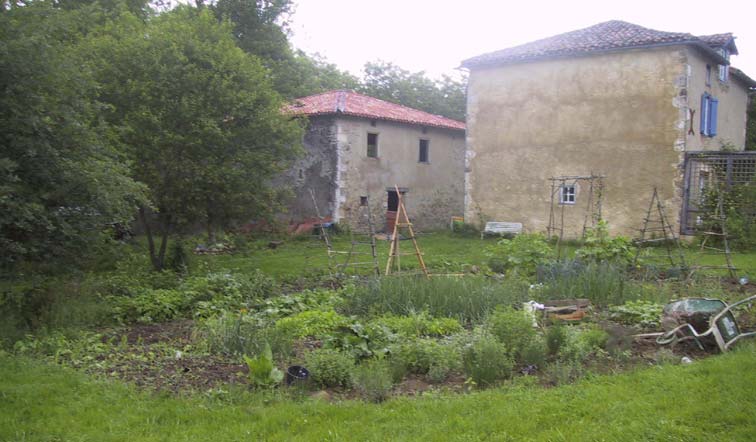
You can see one of Noelle's vegetable gardens in the foreground here. The building on the right is the main house, and on the left is the barn, which consists of a woodworking shop on the bottom floor and a currently unfinished music room on the upper floor. David has some really cool woodworking tools, including a planer that was built in 1948 that still works as well as it did when it was new (sorry... boys will be boys).
In this part of France you can buy land and houses pretty cheap if you agree to rebuild them in some manner that fits into the local architecture. Exactly what that means changes from place to place, but mostly it consists of trying to rebuild the houses to look like the rest of the houses around. For example, if David wanted to tear this house down and build a Wal-Mart, the plan would have been shot down.
Noelle has a garden where she grows something like 1000 kinds of lettuce (Noelle's note: that'd be 27 to be exact, plus 24 varieties of tomatoes, 9 each of eggplants and peppers ...you get the idea) and all kinds of other good stuff. I even took over operation of a shovel for a couple of hours just to prove that I remember how to do it (it's been a while). I didn't really get the full benefit of her garden because I'm here right at the beginning of the season, and it's been raining a lot, but we did have fresh cabbage, salad, eggplant, peppers, squash and a few other items from the garden nearly every day. Her and David are quite into plants, flowers, roses and all kinds of stuff. We'll walk out the door and I might make an exceedingly astute comment like "smells nice", and Noelle and David will have a ten-minute conversation about which particular flowers are contributing to the smell. Yet another example of just how many things there are in the world for a person to learn about.
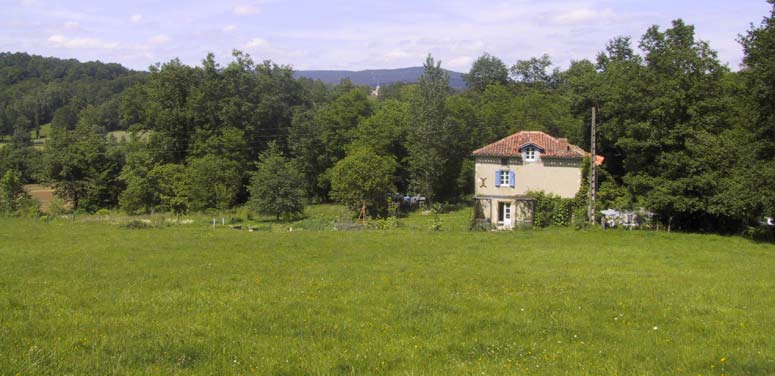
This region is dotted with small villages about every 10 km (5 miles) or so. Most villages consist of around 20-100 houses of various kinds. I ended up going through a whole bunch of them at various times. There are also quite a few farms here and there, but not enough to give the area a "farming community" look. You see evidence of agriculture here and there, but none of it seems to be on any kind of large scale. France is well known for it's agricultural subsidies, which as far as I can tell consist of taking huge amounts of money from the 95% of the population that aren't farmers and giving it to the 5% who are... essentially the same as American Corporate Welfare.
There are differences between the villages that the discerning can detect. Unfortunately, I'm not one of them. It was kind of funny. Noelle would go through a village that she just hated for various reasons, when to me it was indistinguishable from the previous village that she liked. I had her explain why she liked one and not the other, but never understood the explanations.
Noelle's boyfriend David is an actual bonafied journalist. Well, actually he's a music teacher now, and was a cabinetmaker before that, but before that he was a journalist, writing freelance for a few English newspapers. I read a couple of his articles on Romania that were interesting. They were good for pointing out just how ignorant I am of Eastern Europe.
David wanted to have a go at the Sweet Machine, so I pulled it out of the barn, adjusted the boom down, gave him the standard bent cyclist lecture about relaxing the upper body, and we took off for about a 20 km ride so he could get the full effect. Since he's an actual writer instead of a run-of-the-mill-geek-recumbent-cyclist, I asked him to write up his experience. Here it is:
This is about Wade, my girlfriend's 200 pound, shaven headed all-American code-slinging Stepdad, and his crazy trip across the five continents of the globe on what appears at first sight to be a cross between a recliner and a rowing machine, loaded to the gunwales with 70 pounds of luggage, 69 pounds of which consist of either fantasy fiction or trail mix. There, I've already mentioned weight three times. Wade says however that it isn't as crucial factor as you might suppose: on the flat it hardly affects his progress (this would be a useful theory to try out, say, in Holland or Kansas) and going downhill it speeds him up to a bottom-puckering 60 kph or more. Which leaves the uphill part. Here on the first warning slopes of the Pyrenees (the mountains which separate France from the Iberian Peninsular) there is unfortunately nowhere to go but up. At least if you're heading for sunny Spain. But does this prospect perturb Wade? Nope, he's cleared the local supermarket out of peanuts, dried fruit and M&Ms and seems totally unfazed by the idea of hauling it all up the twenty million or so switchbacks that stretch from here to Andorra (a tiny mountain country squeezed between France and Spain where all purchases are tax-free and the official language is Catalan.) Wade is fearless. Not always decisive maybe but utterly fearless.
In the complex equation that you would have to write in order the describe precisely Wade's vehicular progress across the Pyrenees, aerodynamics are, apparently, a more important factor than weight. And on that level he has the advantage over practically any form of transport less sophisticated than a Lamborghini. Wade on his bike is more aerodynamic (and only slightly smaller) than a Boeing 747. He's like a fighter jet on wheels. All because of course Wade is going round the world lying down.
It's a strange sensation. It's something like soaking in the bath but instead of playing with the taps with your toes you have to pedal, in order to stay upright. Because you're lying down, your whole system of balance has to adapt to keeping you upright in this position, especially as you head is inclined back at a very comfortable, but unaccustomed angle. It takes a while to actually get under way without tipping over or veering into the nearest ditch. When Wade very generously agreed to let me try his bike, certain adjustments were necessary, as I measure 5'7", approximately half Wade's height. Recumbent bikes are sold in a variety of sizes according to the distance between the gluteus maximus (the crucial buttock muscle which is braced against the seat) and the instep of the rider, on a sliding scale running from the Munchkins to King Kong. It looked to me as if Wade was going to have to virtually destroy his bike to make it possible for me to ride it, but in the end he managed to get it to function in the most retracted position (boom fully in) although we had a little trouble with the gears, owing to the slackness of the chain. Luckily I had a support vehicle for this trip in the shape of Noelle's mountain bike, ridden by Wade himself who had hoped never to have to get on a 'diamond-frame' and experience again that ole' restriction in blood supply to the genital apparatus.
It was a beautifully sunny day with a fresh breeze. Once I had overcome the balance and steering problems, assisted by Wade coasting along behind me and hollering "RELAX - YOUR - SHOULDERS!" at me as I tensed up and careered towards the verge, it turned into a fascinating experience. Can you imagine cycling in an armchair? The airflow is up your body and thence over you face; you see the road ahead of you over the toes of your slowly rotating trainers; as you begin to relax your muscles, a feeling of well-being creeps over you and you find yourself taking in the countryside, looking up at the trees and birds, from this new, near-horizontality. Wade is pedaling along beside you, offering useful advice about gear-changes, and marveling at the blindness of a humanity which generally seems to prefer to cycle in a more upright position. He's a self-confessed recumbent evangelist. But you don't mind because you're gliding along feet-first between flowery hedgerows: one minute you feel like you're swimming on your back, the next like you're in free-fall, just watching those toes go round and round. The leg-muscles are slowly adjusting to the new position. Then you come to the first hill.
The problem with hills is that, being a greenhorn, you slow down, you have to screw around with the gears, you lose momentum, you veer wildly in all directions, and then you fall off. That's when it comes in handy to have a support vehicle around. Wade actually had to hold me upright and get me going again a number of times. He also gave me some crucial advice: it all depends on the exact position from which you begin to pedal. I felt like a child again. You'll see, if you ever get on a recumbent.
The best thing of all is that you carry your own comfy chair with you wherever you go. We finally got to a village called Fabas (about 9km from our starting point at the house), bought French pastries and milk, the latter to supplement any possible inadequacy in the fat content of the former, and stopped under a shady tree to admire the vista and chat awhile. The wind was still fresh and rippled the flowery grasslands between us and the still snow-topped peaks of the Pyrenees, Wade's next destination. On a recumbent you can put your feet down and sit there, rocking gently back and forth and admiring the view, just as if you were in your recliner at home.
It's totally unlike any other form of transport I've ever tried, and it must transform the whole experience of traveling, especially over the distances Wade covers. To be a able to do that and earn a living while you're going along is quite an impressive achievement. We all probably feel a twinge of envy and admiration for that freedom. Of course it attracts a lot of attention - would I have sat down and written this about a guy on a trailbike? Probably not. Maybe I'll get one of these things after all.
David Thompson
Bordeneuve
Betchat
09160 France
Nice article, don't you think. If you would like to chat with David or Noelle, write them at his address above (you know, using pen and paper). I guarantee you; Noelle and David will find the letter really cool. You can also send me an and I'll forward it to Noelle, who will eventually read it, but that won't be as neat.
Every large city in America has a "French Restaurant". Those and a few trips to Paris formed my idea of French cuisine. It turns out that the name is not quite accurate. A better name for such restaurants would be "Food like they eat at fancy restaurants in Paris but nowhere else in France", but you can see that they would have obvious problems fitting that on a sign, and it doesn't have much of a ring to it anyway. See there - even a geek can grasp the basics of marketing. Here's what I think I know about French food now.
Most of the food I actually ate in France was cooked by Noelle or David, both of whom seemed to take a dim view of any meals I offered to cook... something to do with my cooking lacking subtlety. They didn't even have any habenero peppers, so I would have been at a loss to know how to proceed anyway. They even took the rather unconventional view that my doing the dishes was adequate compensation for not cooking. Go figure. At any rate, I'm not going to talk about Noelle's cooking much. It's excellent of course, and I suggest you all come and stay at her house for a week or two to try it out. However, I'll try to talk about the other French food that I did have on occasion. It turns out that I can cook just fine as long as I never touch any kitchen tool other than my wallet.
The French food that I got in the family style restaurants around here is completely different from what I previously thought of as French Food. The stereotypical idea of tiny quantities of food on fancy plates with fancy sauces that look good but require you to fix a hamburger when you get home doesn't fly here. When you go into a restaurant here, you do not go away hungry, and if you do it's your own fault. The food was excellent, and there is definitely no shortage of it.
I usually ordered a "menu" which is just a multi-course meal. These usually vary in price from about 8-18 Euros. Being a middle of the road guy, I tended towards the ones that are 12-14 Euros. The more expensive ones had the same food, but more courses. Since I nearly had to have David use a wheelbarrow to haul me out of the restaurant after the ones I had, I didn't think I'd go for the bigger ones.
Each course usually has 2-5 choices, and the menus I ate had 2-3 courses. When I was with David or Noelle, they would explain what was in each item. About half of the rest of the time in France I lucked out and had someone that spoke English. If that didn't work, I just ordered something more or less at random as usual, and depended on the luck of the draw.
A few times I had a duck dish that was astoundingly good. I've never been much of a duck fan until I had some very well prepared in Hanoi. Since then I've tried it a few other times, but never found it to be any good until I got to a small village a few miles from Noelle's house. I don't quite know how it was cooked, just that it was really good.
I had an appetizer that was sort of like the biscuits and gravy that you would have in the Midwest. It was a small pastry bread sort of like a round croissant, with a thin brown gravy and bits of meat in it. The spice was quite good and I really liked it.
One big regional dish for Southwestern France is called a "Casiolet". This is the rough equivalent of Pork and Beans at home, except the meat is some kind of bird (usually duck), the beans are big like the Foul beans I had in Egypt, and the sauce is entirely different... well, I guess it isn't all that much like Pork and Beans at that. It's quite good if you can manage to work your way through the quantities served (enough for 3 ordinary men and 2 boys).
They make a lot of things with crepes here. I liked some of it, and found some of it odd. You can get anything from sausage and sauce to minced salmon and sour cream stuffed into a crepe. Most of the time that I tried it was when I was playing Russian Roulette with the menu because Noelle wasn't along to translate. I liked it about half the time. Of course, they also have crepes with chocolate sauce for desert that is quite good... aside from the obvious lack of vanilla ice cream.
Most meals have dessert, which was generally OK but nothing worth writing home about. Flan is very common, as are various forms of ice cream. It's quite common to get some kind of cheese for dessert, which you eat with bread.
Along with cheese, French bread is one of the highlights of living here. Most big cities in the U.S. have a reasonably good assortment of breads... at least it seems reasonable until you get to France. Keeping in mind that Noelle lives completely in the sticks, within easy reach she can easily obtain at least 20 different kinds of bread. Most of it isn't sliced. You just buy it in a loaf and slice it to order. You can get anything from light baguettes to fairly heavy multi-grain stuff. About every third day, we would have a different loaf of bread to work our way through, and most of them were quite good. Noelle also makes her own bread from time to time. All restaurant meals have bread that's always fresh as far as I can tell. The French rarely seem to put butter on the bread except for breakfast.
The coffee in France (and most of Europe as far as I can tell) is generally quite good, if you can manage to order what you want. If you just say "Cafe", you get a tiny little cup about the size of an Espresso in the U.S., except it isn't Espresso. It's about the strength of an ordinary cup of Starbucks coffee... either that or I've burned out my taste buds with bad coffee and it's exactly Espresso. I'm never quite sure these days. There's a French word for a bigger cup of coffee, but I could never remember it. In general though, except for whingeing about the size of the cup, the quality of the coffee was always top shelf.
The French take their cheese seriously, and can't imagine how the U.S. became a superpower without paying much attention to such an obviously important topic. Nearly any French person could easily name a dozen types of cheese, what they're made of, what kind of meal they would go with, which wine you would use with it and so on. The people in this region spend a pretty high percentage of their income on cheese. You always buy it from a shop where it's cut off a big round of cheese. I imagine you can buy it pre-packaged in plastic, but I never saw it. Every village has a "market day" where they set up a market area and the locals sell fresh produce and the like. It's an extension of the medieval markets that existed here hundreds of years ago. Noelle usually buys her cheese there, fresh from the producers. You can also get it in supermarkets, where it's still cut from a big round of cheese at the meat and cheese counter. Most villages also have at least one cheese shop that sells nothing but cheese.
Noelle and David usually kept about a half dozen types of cheese in the house. I never developed into a cheese snob, but I can see how one would. Noelle patiently told me the names of lots of them, but I just couldn't remember them and didn't write them down. My personal favorite is made from a blend of 3 types of milk: goat, cow and ewe (sheep). It has an off-white color, say a little less white than Swiss. It has a flavor that's hard to compare to any cheeses I'm familiar with. It's more subtle than Cheddar, but not bland like American. It goes quite well with a bit of French bread.
They had Briex (pronounced Bree), and David was appalled that I'd heard the word but didn't really know how it tasted. It turned out to be excellent. It's also about the same shade of white, but much softer. You can spread it across the bread like butter if you want. The taste is a bit sharper than most cheeses, and it has a stronger smell.
Parmesan is usually kept in block form and grated over your food, and I assume they would look at disdain on the pre-packaged variety.
Noelle and David had a bunch of other forms along most of the time. If you get to France, just go to a market and start buying it at random and you can't go wrong. The only types I didn't particularly like were the ones that were extremely smelly. There are a few of those, and lots of people like those better than the non-smelly variety so give it a try.
One thing I found kind of frustrating in France was the lackadaisical attitude they have toward having businesses open. France has a 35-hour workweek, which I actually think is a good thing (25 would be better). Americans are WAY too obsessed with work, particularly when a very large part of the work that most people do doesn't actually accomplish anything except make some rich people richer. For example, most people in Silicon Valley work a substantial percentage of their time to pay the mortgage on a house that costs ten times what it's worth because it's Silicon Valley. All big cities are that way, and all you're doing in the end is giving money to someone that by definition already has plenty.
In France, they've gone to the other extreme. They have a short workweek, and a pretty heavy social cost to having an employee because they have even more subsidies and handouts than in the U.S. (if you can imagine that). For example, farmers get huge subsidies, there are very generous unemployment benefits, welfare packages and lots of other things. Someone has to pay for this, and it turns out that it's employers and the people that actually have jobs. This means that most businesses close between about 11 and 3, because they can't afford to pay the overtime to keep the shops open. Since EVERYONE does this, it isn't really a problem because everyone knows that you just don't shop during those hours. I found it frustrating, because being a ways outside of town (2 hours by bike or 15 minutes by car) and depending on Noelle for transport if I didn't want to spend all day getting to town and back, I was always ending up having to work the schedule around those closing hours; or more often I would already be in town for some reason but couldn't do what I wanted without waiting an hour or two for the shops to open. I think if I were there for a while, I'd just get into the swing of things and accept it. I don't think it's actually a bad way to live, but I found it frustrating when it inconvenienced me personally.
The restaurants were similar. In the small villages around Noelle's house, it isn't at all uncommon for a restaurant to close randomly. They may close because the chef takes a day off or is sick, or because there just doesn't seem to be enough business on that particular night to stay open, or whatever the reason. Nearly every restaurant is closed on Thursday and Sunday. I went to take David or Noelle to dinner several times, and found that lots of times we had to make a whole bunch of calls just to find someone that was open for business. Again, I found this personally frustrating but don't really think it's a bad way to operate.
Noelle and David both work as music teachers, so I ended up attending a couple of their "Auditions". In French, that word translates roughly to "Recital" in English. In France, one of the government subsidies that I agree with is a lot of support for the arts. One form this takes is that each "Department" in France (like a region or state) has at least one music school that's partly subsidized. David works there full time, and also tutors private students. Noelle tutors other students as well. The schools can take the form of music only, or music and dance, or I presume any combination of the traditional arts. Part of the tuition is paid by the government and part by the students. This makes an interesting combination of students that I've never really encountered in the U.S. Since the school isn't just the music department of a regular school, they can have different mixes of students. It's not at all uncommon for ten year old violin students to be studying with 60 year olds. They seem to group them together more-or-less by skill level, and go to town.
I attended two auditions for the music school, but would have had to stay another month to hear Noelle and David's private students play. The first audition produced some funny results. Noelle tried to introduce me to some of the people she knew. Unfortunately, in French the word for "Stepfather" is the same as for "Father in law". She introduced me using that word, and that got half the people trying to figure out how I could be David's father. The other half of the people that just saw me asked if I were David's brother... apparently assuming all foreigners with shaved heads must be related. It was quite amusing really.
The auditions were good entertainment. Most of the musicians were pretty good, and the programs were well put together. I particularly liked the last one where they integrated the students from a couple of tap-dancing classes into the performance, and it all worked out quite well.
Noelle and David also did a concert at a restaurant during a "Fete". Every village in France has a Fete once a year. This is like a festival, where all the restaurants and bars in town get various kinds of musicians, and a few stages are set up in public grounds as well. Part of the cost of the musicians is paid for by the "Fete committee", which is another arts subsidy. Aaron and I got to listen to David and Noelle play, which they did quite well. I haven't heard Noelle perform for several years so that was really nice. Then we wandered around and listened to a bunch of the rest of the bands.
One thing I've noticed a lot when I travel around is the pervasiveness of American music. I'm not all that surprised to hear music in English when I'm in a hotel or other tourist place, but I seem to hear it a lot in places where I appear to be the only foreigner that's been in for quite a while. This has been true everywhere I've been. It's not surprising in English speaking countries, but seems a bit strange in France, Russia or Vietnam. Quite a few of the acts in David's audition and in the acts at the Fete were singing in English.
About the time I was going to leave Noelle's house, I abruptly decided to hang out and help David put in a wood floor in their workshop (bet he regrets that "Indecisive" jab now). I spent a large part of my life making big pieces of wood into little pieces, and it seemed like it might be a good thing to do. David and Noelle have done a tremendous job of turning a burned out old wreck into a nice home, and I thought it might be nice to help out a bit. They have a concert coming up in July for all their private music students, and wanted the top of the barn to be done for it. I figured I'd stick around for a week and whip it out. It turns out that flooring estimates are about as reliable as software estimates, but I'm getting ahead of myself.
 The crew for this particular
venture turned out to be David, Noelle, myself and a Canadian woofer named Aaron. Aaron is a pretty
typical woofer... or as typical as such a diverse group can be. He's in his third year of university
and wanted to go to Europe for the summer. He managed to scrounge together plane fare, but didn't have
much money left over. He knew some people in Germany he managed to stay with for a bit, and then he
spent some time camped out in a park in Heidelberg, and then hitchhiked down to Noelle's place and stayed
about twice as long as he planned. Not only that, he had the poor sense to leave me with a completely
silly-assed photo in electronic form so I naturally published it on the Internet... what did he expect<g>
The crew for this particular
venture turned out to be David, Noelle, myself and a Canadian woofer named Aaron. Aaron is a pretty
typical woofer... or as typical as such a diverse group can be. He's in his third year of university
and wanted to go to Europe for the summer. He managed to scrounge together plane fare, but didn't have
much money left over. He knew some people in Germany he managed to stay with for a bit, and then he
spent some time camped out in a park in Heidelberg, and then hitchhiked down to Noelle's place and stayed
about twice as long as he planned. Not only that, he had the poor sense to leave me with a completely
silly-assed photo in electronic form so I naturally published it on the Internet... what did he expect<g>
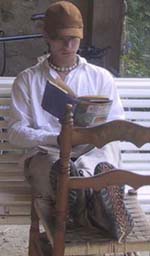 David and Noelle have a good
library of books, so Aaron spent a lot of his time working his way through a couple of the more interesting
ones. Here he's reading Jules Verne's 20,000 Leagues Under The Sea. It's one Verne book I didn't
read so I read a few pages of it, and it's very cool. For it's time and place, it was hugely prophetic
and I can just imagine how the readers of the time reacted to it. David and I spent a whole evening
talking about the Mongol invasions, since he's the only person I've run into that knows a lot about it.
I would have liked to take a few of his books along with me, but the ones I wanted were hard to find and I
already have about 15 pounds of books along that I can't seem to shake anyway (that's right... I'm going to
haul a pannier bag full of books over the mountains).
David and Noelle have a good
library of books, so Aaron spent a lot of his time working his way through a couple of the more interesting
ones. Here he's reading Jules Verne's 20,000 Leagues Under The Sea. It's one Verne book I didn't
read so I read a few pages of it, and it's very cool. For it's time and place, it was hugely prophetic
and I can just imagine how the readers of the time reacted to it. David and I spent a whole evening
talking about the Mongol invasions, since he's the only person I've run into that knows a lot about it.
I would have liked to take a few of his books along with me, but the ones I wanted were hard to find and I
already have about 15 pounds of books along that I can't seem to shake anyway (that's right... I'm going to
haul a pannier bag full of books over the mountains).
My previous experience of floor building usually went something like "get a couple units of surfaced lumber and a skill saw, and start cutting and nailing". It turns out that in France, you can buy surfaced lumber just like I used to use (it's called Parquet); but that's not what David wanted to do for various reasons. Here you can buy lumber that's just a single saw cut from a log with the rough edges still attached. We would call these "Jacket Boards" back in the sawmill, and they would have a life expectancy of about the 30 seconds it took to get from the band saw to the edger. I haven't seen them sold to outside customers since the early 60s, but it's still pretty common here in France. David chose to get the rough lumber and finish it off ourselves, since he had all the equipment to do so. We spent the next week or so performing that task.
First we took the rough boards, marked a straight edge on them with a pencil and made the first cut with a table saw. Then we ran them through the planer-thickneser (made in 1948); for the 1-3 passes it took to get them all the same size and roughly even on the side that would be down (the ceiling of the workshop). Then we ran the saw cut edge over the planer to make it even, and finally ripped the last edge with the table saw, and then ran the other side two passes through the planer to make it smooth and even for the top edge. Next we made a jig to cut the ends square using the table saw and a carriage, then used a molder (like a giant mounted router), and cut a groove in all 4 sides. We made tongues from the leftover scrap lumber to hold them together, and then we were ready to start nailing.
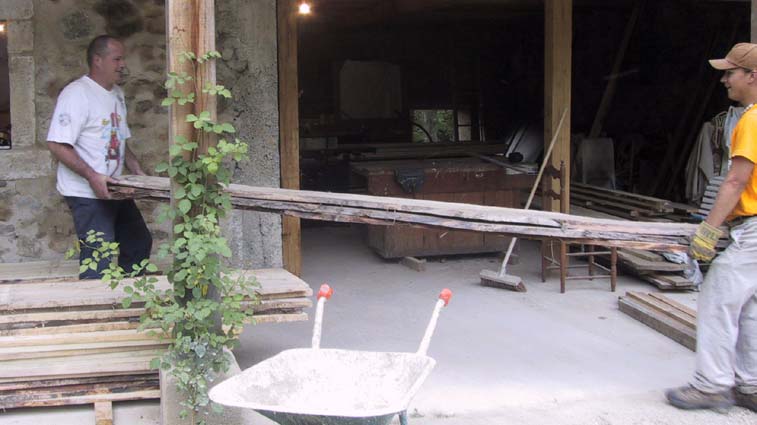
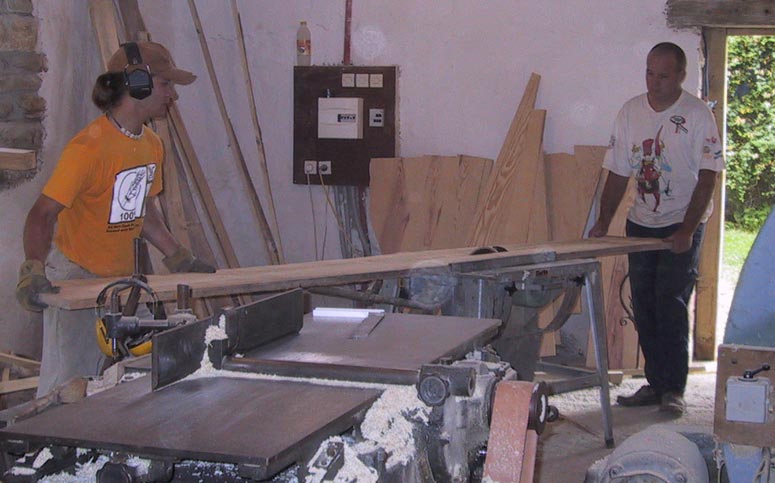
This method of doing it saved David a fair amount of money, and it's also a somewhat more ecological way to do it since the waste is very small. We cut the planks to more-or-less random widths. As long as we could get a run of one width, we would use it so we ended up with about 20 different widths from 12-50 cm (5-20 inches). As an added bonus, it makes a more interesting finished floor than a floor of all the same width would make. The tongues that went between the boards to hold them even were made from the waste we cut off the edges.
Unfortunately, the lumber didn't plane up as well as we had hoped, and in the end we had more waste than David planned for, so he's going to have to get some more lumber to finish it. David's mother visited about 2 weeks after we started the flooring project so he couldn't supervise it any more so Aaron and I had to leave with the job not quite done :(
I originally planned to come here for a couple of weeks, and stayed for a couple of months (that should sound familiar). It was time well spent. I haven't really spent a lot of time around Noelle since she left for college 8 years ago (yeah, I know... I'm getting old). I hadn't met David at all before and I had never really spent any appreciable amount of time in France, except for Paris which doesn't count. David is an interesting guy, and we had a good time getting to know each other. He's very adept with languages, and seems to speak around five or six reasonably well. He spends 3 months in a country and speaks the language. I spend 3 months in a country and I still mispronounce the standard pleasantries. David and I got along great, but of course an old sawmill hand and a cabinet maker obviously should.
David, Aaron and I also had a good time teaching each other the slang from Canada, the U.S. and Britain (I'm afraid I can't really give you any examples here). Most of our work time we had all the bad traits of a bunch of teenage boys, without any of the redeeming cuteness. I'm not sure how Noelle managed to not strangle us, but it appeared to be a struggle.
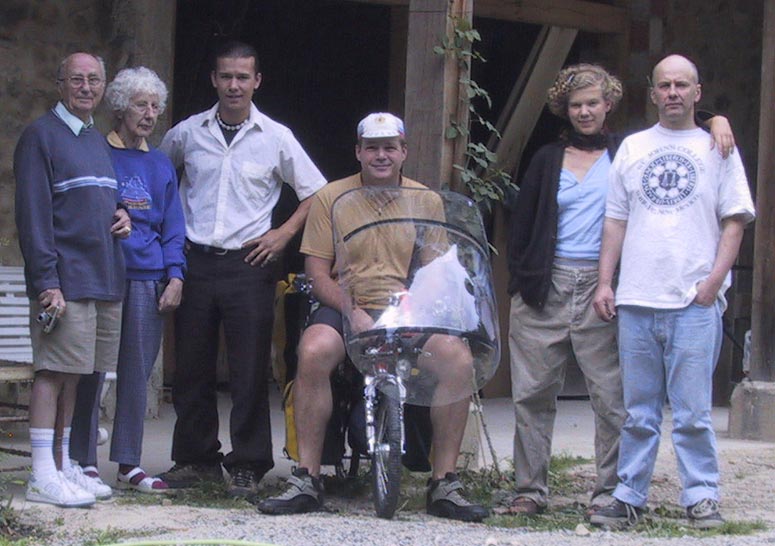
Eventually it came time to actually leave. I could easily have just moved in and stayed for another six months, but it was time to head for Spain, so I finally fired up the bike for the first time in six months, paused for the obligatory group shot, and headed down the road (well, "down" isn't the exact right word). That's David's mother next to Aaron, and her husband next to her.
I had Aaron take a few shots of me on the bike with my new fairing (which makes the bike look even weirder). I wasn't going to show them because I packed on a few pounds in Cape Town, and my bike is custom designed to make it look even worse; but of course refusing to show the photo would be cowardly, so here it is. I'll show another one when I lose about 10 pounds (roughly 3000 miles).
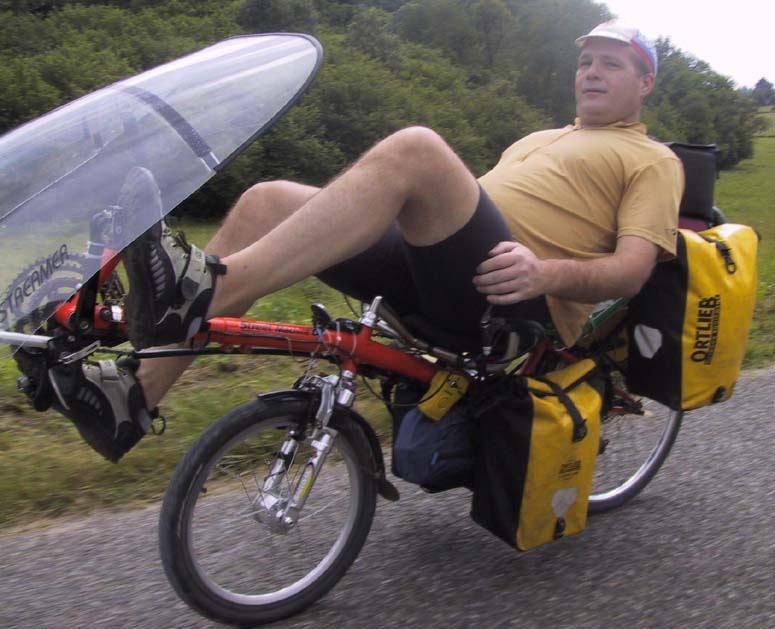
Notice the cool Russia cycling hat I mentioned before but never showed. Now Etienne can quit whingeing about my old bandana I wore in Vietnam, which is good since I lost it anyway. You can also see my custom designed Instrument Panel just above the front tire. That's a cycle computer and heart rate monitor, obviously tied on with cable ties. Someone stole my old heart rate monitor and the tail flasher from my bike in Cape Town, which has been the only successful theft I've suffered in 18 months of cycling.
One of these days I'll make a cycling page that tells what's in all those bags (besides fantasy fiction and trail mix). The front tire you see is an Air Bags, and it's been the best tire I've bought so far. It made it all the way through Russia and South Africa (about 5000 km), and it's still not worn out. The little yellow box right under my butt is a cycle alarm I bought from Jacques. It has a loud siren that goes off if someone cuts the cable, and also has a motion sensor. The bag right under the seat contains a sleeping bag and first aid kit. The bundled roll under the lunch box behind the seat is a tent and thermarest. One of the smaller pannier bags under the seat is full of books that I can't seem to leave behind.
I expect I'll be spending a lot more time around Noelle's place in the future, so I didn't want to completely wear out my welcome. A friend of mine is getting married in Northern Italy next spring, so I'll obviously have to visit then. Sooner or later, I'll have to give France a proper tour as well. Some day I'd like to do the Tour de France route (obviously at 10% of the speed that Lance does).
This particular stay was my favorite interval of the trip. It's nice to wander around randomly for a while, but when it gets right down to it there's nothing quite like being with family.